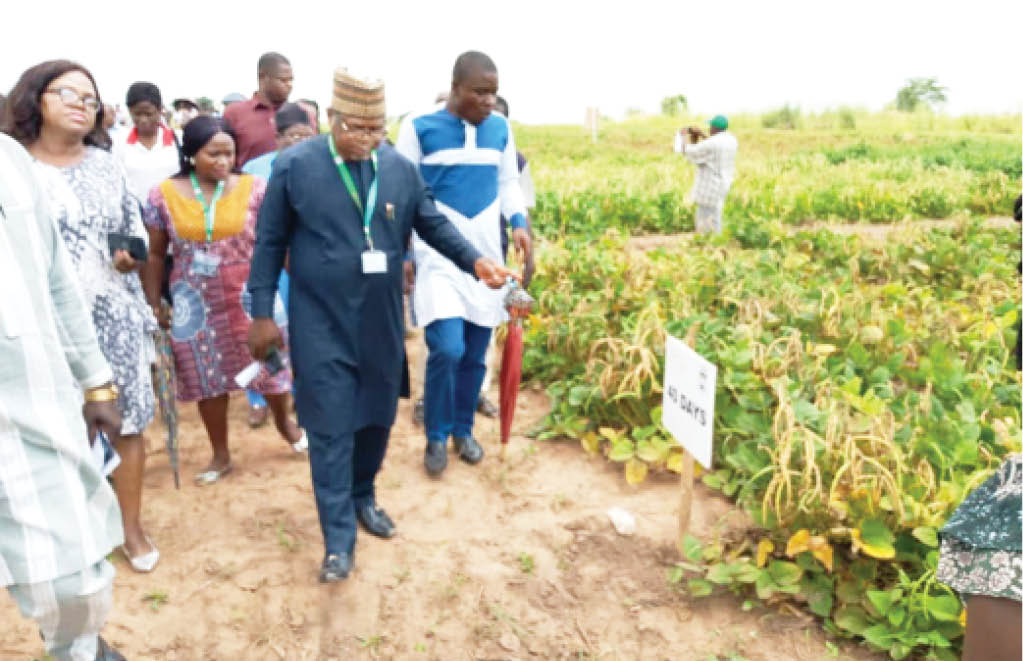Why Benue farmers prefer ‘Kwankwaso’ cowpea
Despite the blazing sun, farmers in Benue State were not deterred as they patiently walked through the length and breadth of the large cowpea plantation owned by the Federal University of Agriculture, Makurdi (FUAM). Guided by researchers in different fields of agriculture, the farmers halted their movement intermittently to examine, deliberate and scrutinise the varieties […]

Despite the blazing sun, farmers in Benue State were not deterred as they patiently walked through the length and breadth of the large cowpea plantation owned by the Federal University of Agriculture, Makurdi (FUAM). Guided by researchers in different fields of agriculture, the farmers halted their movement intermittently to examine, deliberate and scrutinise the varieties of the cowpea before them.
The farmers were drawn from various localities in the state to make an informed choice about the kind of cowpea they would like to grow so that the seeds would be improved for commercial production. 
The project, known as Accelerated Varita Improvement and Seed System Delivery in Africa (AVISA), is managed at the commercial farm of the FUAM, in collaboration with the International Institute of Tropical Agriculture (IITA).
Sponsored by the Bill and Melinda Gates Foundation, AVISA seeks, among other things, to conduct trials of pre-released lines, released varieties and seed production.
AVISA’s cowpea seed systems focal person for Nigeria, Teryima Iorlamen, said the exercise would enable farmers to adapt whatever the breeders had improved upon.
“Whatever breeders are doing, we take it to the farmers to see if they could be adopted. So, this exercise involved us (AVISA) taking the farmers around the field to see for themselves and make their choices of what the breeders are talking about, by confirming whether it is true,’’ he said.
Iorlamen said the project was being carried out in seven countries, including Nigeria, and the FUAM is coordinating the seed system in Nigeria. He added that there were more than 50 varieties of cowpea in Nigeria, out of which the best selected 10 were planted in all agro-ecological zones to find how best the varieties would do on the varied soils.
He further said the best 10 varieties planted at FUAM’s farm in Benue was the reason for the event, which provided farmers the opportunity to compare all the varieties and pick what they know would be best for Benue farmers.
He listed the varieties to include FUMPEA I and II, SAMPEA 11, 14, 15, 16, 17, 18, 19 and 40 days (Kwankwaso). The seeds of the varieties are big, small and brown, or white in colour, while most of them are high-yielding, with early maturity timeline.
At the end of the outing, the farmers indicated their preference for the 40-day variety, popularly known as ‘Kwankwaso,’ which they had not cultivated. This was followed by the SAMPEA 19 (Samaru-Zaria pea) and the SAMPEA 14, as well as SAMPEA 18, which came bracket third.
Also, on the farmers’ order of consideration, the Federal University of Agriculture Pea I (FUMPEA I) got the sixth position while the FUMPEA II came a distant eight.
The criteria for selection included high yield, maturity, seed size and colour, but the farmers’ decision showed that they valued the yield better. They also considered early maturity rate before looking at the seed colour, while the seed size does not matter much to them; hence the least in their idea of selection.
Speaking at the event, the representative of the programme manager of the IITA, Kano, a senior researcher, Rueben Solomon, said Nigeria was the world capital of producers and consumers of cowpea. He noted that Benue State was gradually gaining ground in the production of the crop.
“From what we see in the field, Benue is now a hot spot for cowpea producers. Benue is displacing many states in terms of production in Nigeria,” he added.
Emphasising the essence of the exercise, Solomon said, “We want to involve farmers from the scratch before releasing the seeds. Farmers will select their favourite seeds and the varieties they want. This will be done through field evaluation and ranking. What they choose as their number one will be used. Researchers want farmers to decide on the seed by informing breeders of what varieties they want.
“I am impressed. The turnout was good and participation active. The essence was to let farmers make their choices. We will be giving advice when we come for another trial. Benue is still a virgin state for cowpea.’’
Earlier, a big-time cowpea farmer who was at the event, Crucial Abua, told our correspondent that he owned 10 hectares of cowpea farm in the Gboko area of the state, which would be due for harvest in few days.
Abua said he planted two dominant varieties of FUMPEA II and SAMPEA II cowpea in his farm, saying that while the later manifested many infestations, the former had comparative advantage in management of pesticide.
“They (workers) have started harvesting the FUMPEA II; and I can tell you that the level of infestation was less than two per cent, meaning that infestation was near zero. But for SAMPEA II, the infestation was much, so I had to introduce IMI-Force, which was quite effective,” he explained.
Abua, who is also a special adviser to the Minister of Special Duties, George Akume, hailed the researchers for their consistency in ensuring the improvement of the cowpea seed for the benefit of food sufficiency.
